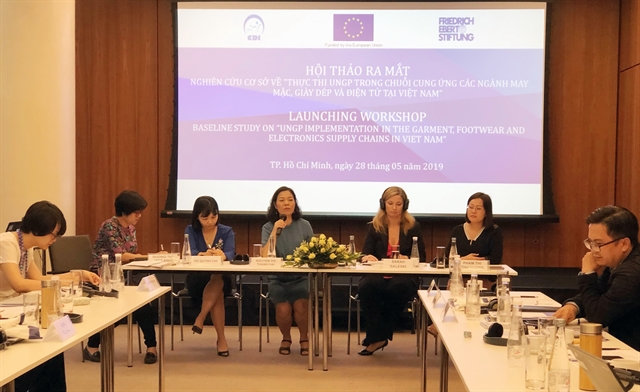 Economy
Economy


|
| A panel discussion at the conference to release the baseline study on the “Implementation of the United Nations Guiding Principles on Business and Human Rights in the Garment, Footwear and Electronics Supply Chains in Việt Nam” in HCM City on May 28. — VNA/VNS Photo |
HCM CITY — All major lead firms in the garment, footwear and electronics industries in Việt Nam have adopted a policy commitment on human rights and ethical issues, a baseline study on the “Implementation of the United Nations Guiding Principles on Business and Human Rights in the Garment, Footwear and Electronics Supply Chains in Việt Nam” has found.
Speaking at a conference to release the study in HCM City yesterday, Đỗ Quỳnh Chi, a researcher at the Research Centre for Employment Relations, said: “There are two types of human rights policy commitments: one is a policy commitment developed exclusively by the lead firm for its own company and business partners; and the other is the adoption of an ethical Code of Conduct (CoC) developed by a third-party organisation.”
In terms of labour rights, the surveyed lead firms are generally committed to the four core labour standards: elimination of child labour, employment is freely chosen (no forced labour), no discrimination in employment, and freedom of association and collective bargaining, according to the study.
They also commit to other important standards such as no excessive working hours, occupational safety and health, humane treatment, payment of minimum and/or living wage and regular employment.
“An increasing number of lead firms have extended the requirements to comply with their human rights codes of conduct to all tiers of suppliers, including indirect ones,” Chi said.
The survey also came up with many other findings, including the fact a number of lead firms have established hotlines for workers in their supply chains to raise grievances.
The garment, footwear and electronic industries are the backbone of Việt Nam’s export sector, accounting for more than 50 per cent of shipments.
The supply chains of the three industries in Việt Nam are highly complex with various tiers of suppliers.
Apart from the first tier suppliers who sell directly to the lead firms, there are layers of sub-contractors who either supply materials or are involved in the manufacture of other items.
“Monitoring the compliance of all suppliers with the brands’ human rights policies, therefore, becomes a major challenge for all the lead firms,” Chi said.
Sean O’Connell, human rights and innovation officer, UNDP Vietnam, said the United Nations Guiding Principles on Business and Human Rights (UNGPs), adopted unanimously by the UN Human Rights Council in 2011, provided the first global standard for preventing and addressing the risk of adverse impacts on human rights linked to business activity and would continue to provide the internationally accepted framework for enhancing standards and practices regarding business and human rights.
The UNGPs contain 31 principles encompassing three pillars: the State’s duty to protect human rights, the corporate responsibility to respect human rights and access to remedy for victims of business-related abuses.
The UNGPs had enjoyed widespread acceptance and support from both the public and private sectors, he said.
A growing number of multinational corporations had also incorporated the UNGPs in their human rights policies and framework, he said.
According to delegates, although the UNGPs have been integrated into the sustainability policies of an increasing number of MNCs sourcing from Việt Nam, they remain a largely new concept both in the public and the political discourses.
Therefore, this has opened up a window to use the UNGPs as a framework to review and improve the sustainable policies and practices of the business community in Việt Nam, especially the companies in global supply chains, they said.
Chi said enterprises should integrate the human rights policy into their core business and frequently review and improve grievance handling mechanisms.
Matthieu Penot, programme manager, development and cooperation section, European Union Delegation to Việt Nam, said the baseline study was conducted under the framework of the project Business and Human Rights in Trade Relations and Global Supply Chains in Việt Nam implemented by the Friedrich-Ebert-Stiftung and Centre for Development and Integration.
The study provides an assessment of the implementation of the UNGPs within global supply chains in Việt Nam, focusing on the three biggest export industries. — VNS




